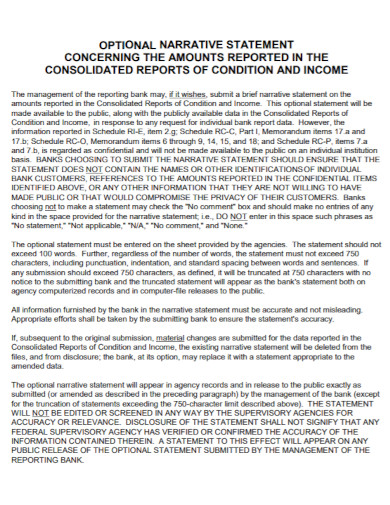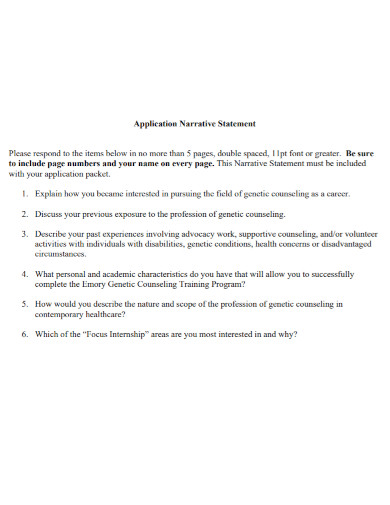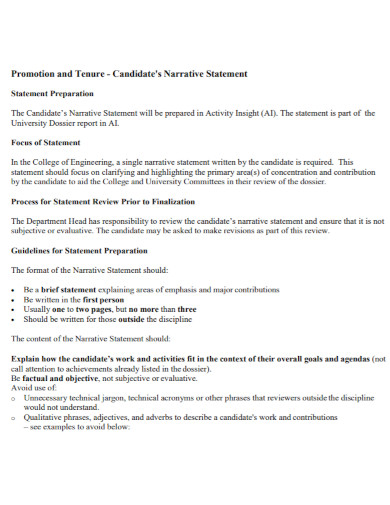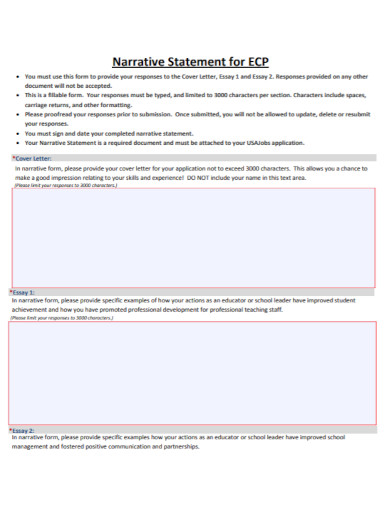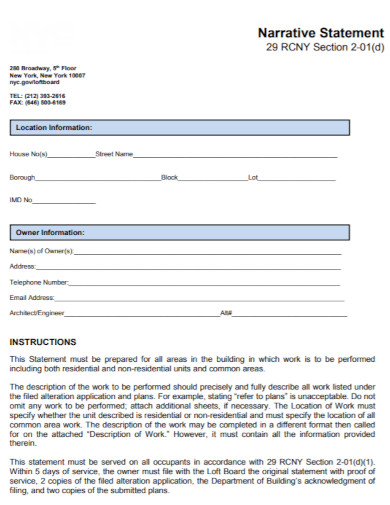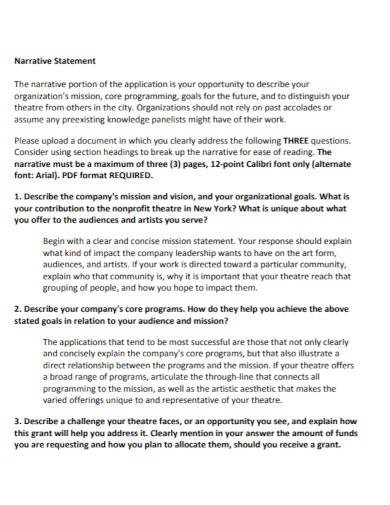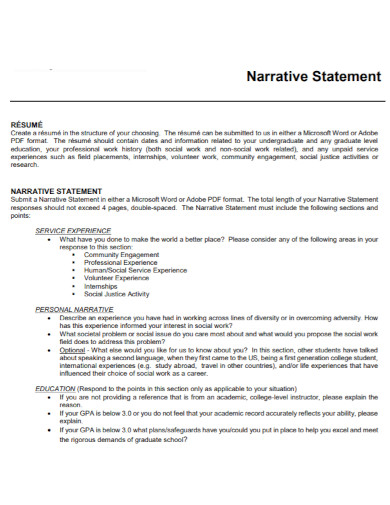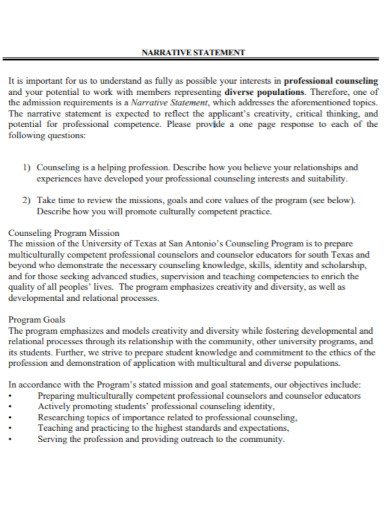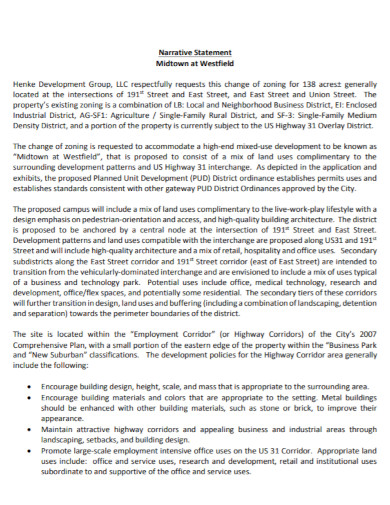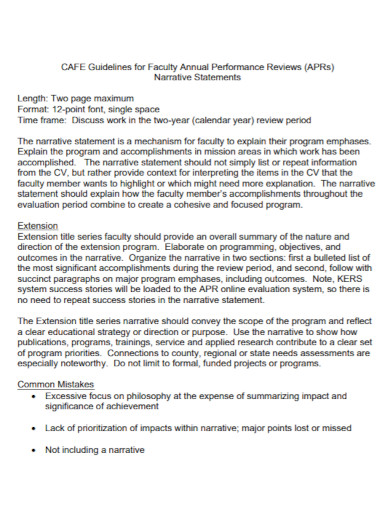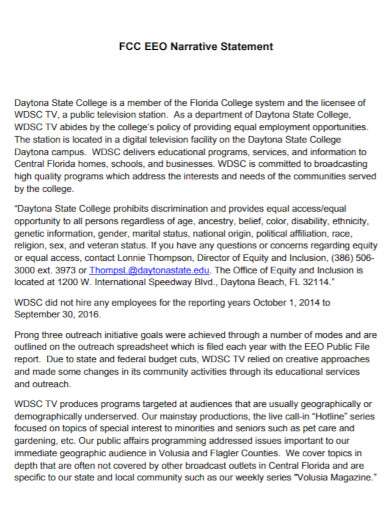10+ Narrative Statement Examples to Download
When applying for any college, candidates are required to make a statement about themselves. Their statement should follow a certain format and should also follow the topic that is given. Most narrative statements are about who they are as a person, what they are planning to do when they graduate and their careers. Other topics can be from the committee’s choosing. Regardless of the topic, each statement should always follow what has been instructed. Here we have 10+ examples of narrative statements.
10+ Narrative Statement Examples
1. Optional Narrative Statement
2. Application Narrative Statement
3. Candidates Narrative Statement
4. Standard Narrative Statement
5. General Narrative Statement
6. Opportunity Narrative Statement
7. Narrative Statement in PDF
8. Professional Narrative Statement
9. Formal Narrative Statement
10. Faculty Narrative Statement
11. College Narrative Statement
Definition of Narrative
A narrative is defined as a spoken or written account or statement that is used to connect events. A narrative is also connected to telling a story. A series of events interconnected to describe or to explain. A particular way of describing an event through a story. A story that describes a series of happenings filled with the dates, people, and the incident. A narrative is often used in schools or when a student is asked to write a narrative for their application for college.
Definition of Statement
A statement is something that a person says, like expressing an opinion. An action done either by saying something or writing it officially. It is a document that shows a lot of details for a person with problems, to give them extra help needed for school. To express one’s opinion. A formal and official account of events given by a witness to a different party. A statement has facts, views or plans as well.
Definition of Narrative Statement
A narrative statement or narrative statements are formal and official documents that tell a person’s life. A true story that has been written by the author to tell a reader of their lives. In the narrative, the author shares their experiences, anecdotes, and other personal matters. A narrative statement can also be used as part of an application for a student, who wishes to attend college. They use the narrative statement to get to know the candidate even more.
Purpose of a Narrative Statement
The purpose of writing a narrative statement is to provide the reader with ideas about you. To answer questions like who you are and what is important for you. Writing a narrative is like writing a story. To engage with your reader in a way they would understand you on a certain level. To educate your readers with anything and everything personal and professional about you or a topic you wish to talk about.
Tools to Use for Narrative Statements
When writing a narrative statement, either for a job application or a college application, there are some tools you can use. Depending on which one you are going to use, they would still be of the same use. However, they may have different formats, they are still as useful for which purpose you are using them. Listed below are some of the most common tools or materials to use when writing a narrative statement.
- Essay
- Questionnaire
- Forms
- Filling out
- Rubrics Based
Tips for Writing a Narrative Statement
Moving on towards the tips. Have you ever written a narrative statement for a job interview or for a college application? If so, how did it go? Was it a challenge to write something so personal and make it into an interesting story? This is why narrative statements are sometimes the most difficult to write. But like any problem, there is always a solution. Check out the following tips, for you as a guide when you begin writing your narrative statement.
- Draft your statement – When you begin writing, begin by writing a draft. Drafting what you are going to write would be easier. As this helps you write what you wish to write without any worry. Drafting your work would also help you turn your train of thought into words. You need not worry about erasures or grammar, as this is not the final output yet. When drafting, you are able to pour out what you want without having to think if this is better or not. This also helps you see which idea you are aiming for and go from there.
- Tone and Language of voice for writing – As you carry on with your writing, avoid using passive voice. It is better as you write your statement to use an active voice. In addition to that, watch what language you use. Avoid having to use difficult jargon. Always match your writing and use of language with your audience. If your audiences are the committee in a college, use words that are right or appropriate for the occasion. The same goes if you are writing your statement for a job application.
- Avoid dragging your narrative – When we write, we often forget that we are writing a story of our personal lives. Oftentimes, we may drag the narrative even for a little bit. Try to avoid that as much as possible. As a narrative statement is a long one, your reader might get too bored reading and would lose interest. This also goes with how you use the right words and the right voice for your audience.
- Write your final output – Once you have written out your draft and rearranged your ideas, it is time to write your final output. As you write your final output, remember to avoid using difficult jargons, and as much as possible, make your statement fit what your audience is looking for.
- Revise before you send – As you are finished with your final output, it is time you revise. Revision does not really mean you have to write the whole narrative again. Rather, it is simply to check if you have any misspelled words, grammatical errors, and if your word usage fits the right audience.
FAQs
What is the word count for a narrative statement?
A narrative statement has a word count of 650 words. As well as it is a paragraph long.
What are the usual topics written in a narrative statement?
The topic that is usually asked when you write a narrative statement is about you. You are sharing a part of you to people in words. This is why in some colleges, they would require you to write a narrative statement. For them to get to know the candidate even more.
Why is it necessary to write a narrative statement?
When you apply for college, you are often asked by the committee to write a narrative statement. The reasons for this are, it is a requirement, they wish to know the candidate applying, and to see what you wish to know more about you either through your college life or beyond that. The same goes when you apply for a job. The hiring committee would want to know you on a deeper, more personal level.
What point of view should I use when writing the narrative statement?
The point of view you should use when writing is first person point of view. The tone should be an active voice.
As you write your narrative statement, remember that this is a way for your audience to get to know you as the author. On a deeper, more personal level. Whether you are applying for a job or a college application, narrative statements are a good way for people to get to know you and see your skills, personality and you on a more professional level as well.


![10+ Narrative Statement Examples [ Student, Application, College ]](https://images.examples.com/wp-content/uploads/2021/06/10-Narrative-Statement-Examples-Student-Application-College-.jpg)
